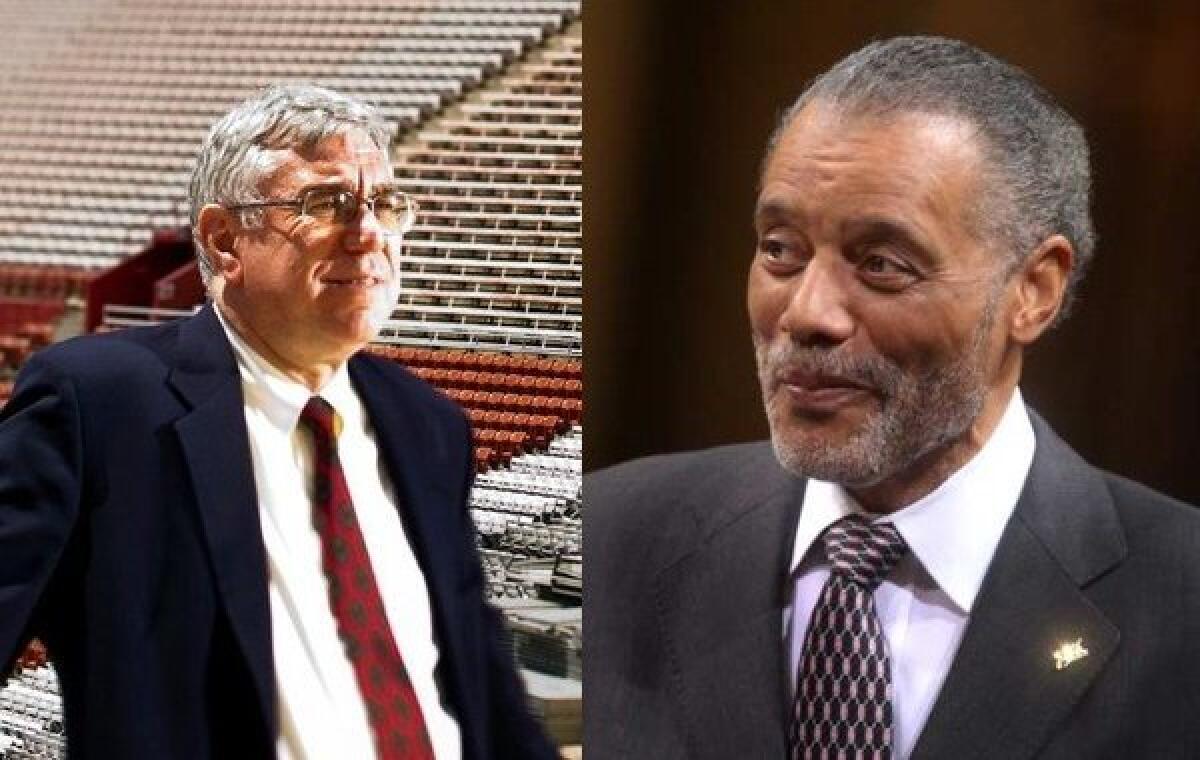Parks seeks to halt vote on Coliseum deal with USC

- Share via
Citing a state investigation of the Los Angeles Memorial Coliseum’s top executive, City Councilman and stadium Commissioner Bernard C. Parks demanded Friday that a Monday vote on surrendering stewardship of the venue to USC be canceled.
Parks also asked the Los Angeles County district attorney’s office to investigate Coliseum Interim General Manager John Sandbrook, who recently became the subject of an inquiry by state ethics officials. They are looking into allegations that the executive illegally sought a job with USC while he was representing the public interest in lease negotiations with the private university.
Such simultaneous discussions would pose a conflict of interest for Sandbrook under state law.
“I believe he has been more of an advocate for USC than for the Coliseum during the lease process,” Parks said in a letter to his fellow commissioners. “I am insisting that Monday’s scheduled vote be delayed until this inquiry is resolved.”
“Being accused of illegally seeking a job with USC while negotiating the proposed lease is a serious charge, especially because it could be considered a felony,” Parks wrote.
Monday’s vote could be significant in the history of the storied Coliseum, which was built as a World War I memorial and paid off by taxpayers. The stadium and nearby Sports Arena are jointly run by the city, county and state.
The governing Coliseum Commission, which has been embroiled in a financial scandal for more than a year, appears poised to give USC day-to-day control of the facility. Under the deal, the Coliseum panel, which sometimes offers the stadium to nonprofit groups, would only be allowed to designate eight “public interest events” a year outside the football training and playing season.
Coliseum officials released documents Friday showing that the stadium, which lost more than $7 million in recent years, is essentially broke. It was expected to have a cash balance of $2.3 million by the end of May; by the end of June, it is expected to have just $15,375 in the bank.
Officials propose to mortgage the Coliseum’s iconic advertising sign next to the 110 Freeway, according to the documents, which are included in the agenda materials for Monday’s meeting.
The proposal would allow the Coliseum to take a loan of up to $1.5 million from USC to help cover expenses. It’s unclear how the Coliseum would pay it back. If the loan and interest could not be repaid within 10 years, USC would be able to seize the sign.
The loan proposal is separate from the lease, which sports industry experts have called highly unusual, giving the campus virtually all the benefits of owning the stadium without forcing it to buy the venue. The value of the Coliseum complex was $240 million to $400 million in 2005, according to a report submitted to the governor’s office at the time.
Coliseum commissioners who support the deal that Sandbrook struck with USC say it would provide for the sorely needed modernization of the dilapidated stadium. Under the proposed lease, USC would fund about $70 million in improvements and pick up the panel’s annual $1-million rent payment to the state. USC is seeking control of the stadium for a total of 99 years.
Parks has been a longtime critic of Sandbrook, whom he has faulted for failing to halt financial abuses as the corruption scandal unfolded. The councilman called for Sandbrook’s firing in September after The Times reported that the Coliseum’s technology manager directed about $30,000 in stadium business to a private firm he founded.
Parks’ letter criticized Sandbrook for allowing payments to the Coliseum’s then-chief finance officer, Ronald Lederkramer, to cover most of the expense of a leased Jaguar and free gas for the car, even though his job required little driving. Lederkramer also earned hundreds of thousands of Visa reward points by making government purchases on his personal credit card. Even as the scandal grew, Sandbrook approved a 17% raise for Lederkramer last summer before it was rescinded under public pressure.
Parks said of Sandbrook: “In my view, what was most embarrassing was his unwavering protection of Lederkramer, who signed a lot of the checks associated with the scandal.”
Sandbrook was hastily hired in March 2011 by commissioners seeking an interim leader after the ouster of longtime General Manager Patrick Lynch, who has since pleaded guilty to conflict of interest in the corruption case and has pledged to return $385,000 he received as alleged kickbacks from the janitorial contractor.
Sandbrook, 63, a retired University of California manager, was recruited for the job by an old college friend, county Supervisor Zev Yaroslavsky. At the time, commissioners said he was hired for his unfailing honesty.
Times staff writer Paul Pringle contributed to this report.
More to Read
Sign up for Essential California
The most important California stories and recommendations in your inbox every morning.
You may occasionally receive promotional content from the Los Angeles Times.














